
What Is Myrcene In Cannabis?
Myrcene is known for its unique aroma and potentially soothing effects. As the most abundant terpene in most cannabis cultivars, it's fairly easy to come by. In this article, we delve into everything you need to know about this terpene, including what it could do for you and which strains contain it in abundance.
Out of over 150 known terpenes in cannabis, the most common is myrcene. Found in numerous other plants and fruits, myrcene offers a variety of aromas and flavours that lean heavily toward earthiness and spice, with a hint of fruit. Furthermore, myrcene has been investigated for its potential wellness benefits. So, what can this terpene do for you? Here we delve into everything you need to know about myrcene, as well as the best cannabis strains to experience its influence.
What is myrcene?
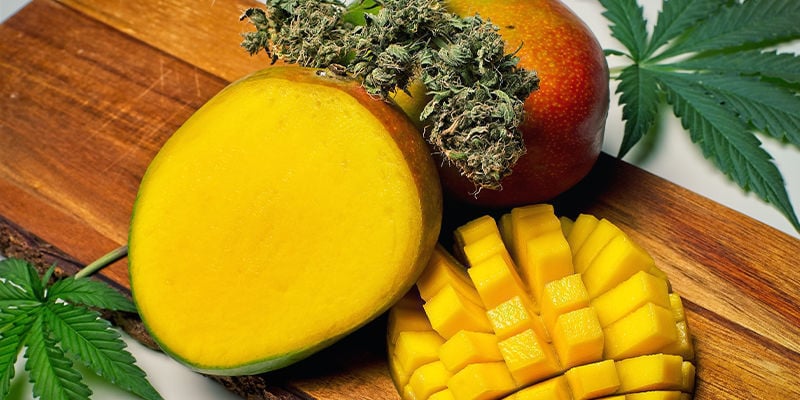
Myrcene, otherwise known as the “mother of all terpenes” given its abundance and potential benefits, is the most common terpene found in cannabis. The name myrcene is derived from a plant native to Brazil called Myrcia sphaerocarpa, which also contains the terpene. The root extract is said to have powerful properties and has been utilised in traditional holistic practices for many years.
Where can you find myrcene?
As well as being found in many strains of cannabis, myrcene is also readily available in other plants, such as:
- Parsley
- Lemongrass
- Mango
- Cardamom
- Wild thyme
- Hops
Interestingly, as a member of the Cannabaceae family (of which Cannabis sativa is also a species), the hops plant contains a very high concentration of myrcene, which is commonly used to give beer a spicy, peppery aroma. Furthermore, myrcene is often used to add scents/flavours to detergents and cosmetics, and also features in various food and drink products.
In cannabis, myrcene is believed to synergise with other plant constituents, such as cannabinoids like THC, to generate unique, potentially more profound effects in humans (Russo, 2011).
Aroma and flavour of myrcene
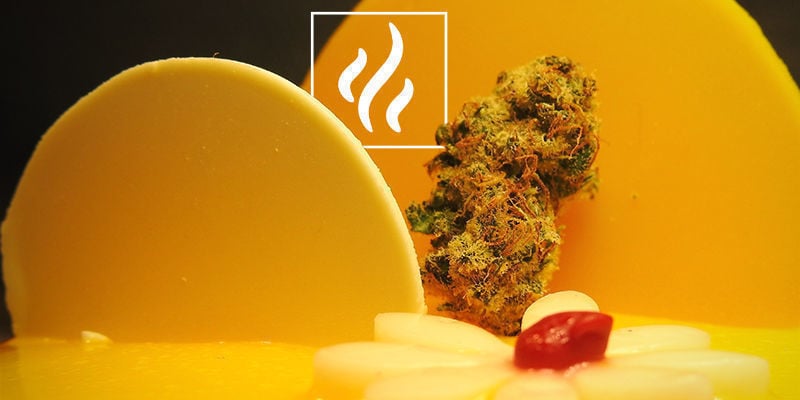
The aroma of myrcene is often described as musky, herbaceous, spicy, and earthy, especially in higher concentrations. However, it also has a geranium-like sweetness to it, and there are some mildly sweet flavours to be experienced when inhaling or consuming myrcene, such as when vaping cannabis or eating mango, for example.
What is the chemical structure of myrcene?
Myrcene, more specifically β-myrcene, is classed as an acyclic monoterpene, which means it has a simple chemical structure with two isoprene units. The acyclic tag purely means that myrcene doesn't have a ring-like structure like some other terpenes. However, this is not uncommon, as the monoterpenes pinene, linalool, and limonene all have similar chemical structures.
Potential benefits of myrcene

As touched upon, myrcene has been examined for its potential benefits in humans. Below represents some of the most compelling, albeit early, research on the matter:
-
Inflammation: A study carried out in 2015 pitted myrcene, along with limonene and caryophyllene, against human chondrocytes—cells responsible for forming cartilage—in hopes of identifying the efficacy of the compounds in cases of osteoarthritis. Of the three terpenes tested, myrcene was noted to display the most significant results related to inflammation at catabolism (Rufino et al.). However, more research is needed before any conclusions can be drawn.
-
Tumour cells: Other research has looked to determine the effects of myrcene, among other terpenes, on tumour cells. One particular study examined the “anti-invasive activity of β-myrcene” in breast cancer cells. Here too, myrcene showed the most potential out of all the terpenes studied (Lee et al., 2015). Of course, the relationship between cannabis and tumour cells is a massively complex one, but current findings are paving the way for more comprehensive trials.
- Relaxation and sleep: Lastly, the most commonly cited benefit among cannabis users is myrcene’s ability to relax the body and potentially encourage sleep (do Vale et al., 2002). As mentioned, myrcene is believed to work alongside other cannabis constituents, such as cannabinoids, to potentially enhance and/or alter certain aspects of the herb’s effects—and this extends to its soporific (sleep-promoting) and soothing effects as well.
5 cannabis strains that contain myrcene
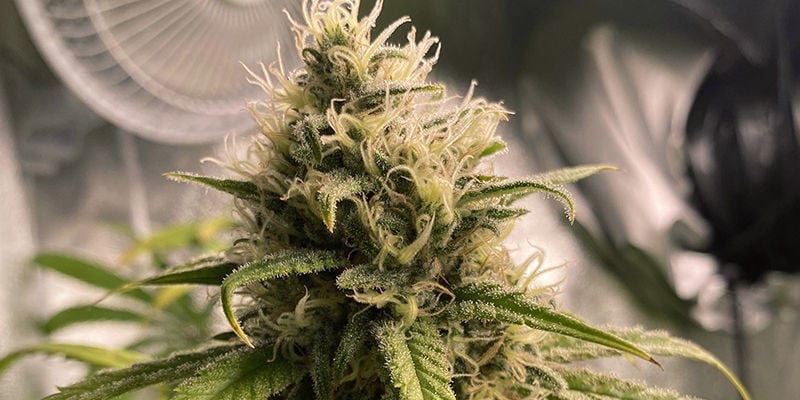
As myrcene is the most common terpene in marijuana, you certainly don't have to look far to find a strain that's teeming with it. However, the following cultivars are certified classics among cannabis consumers, and are known for their myrcene content alongside other impressive attributes. With that in mind, here are 5 strains you should check out to satisfy a myrcene fix.
1. Blue Dream
The result of crossing Haze with Blueberry, Blue Dream is a sativa-dominant hybrid famed for its insanely sweet and fruity flavours alongside its uplifting yet soothing effects—all hallmarks of a myrcene-rich strain. With an average of 18–20% THC, Blue Dream is not the most potent strain you'll ever get your hands on, but it’ll quickly put you into a dreamy, terpene-fuelled daze.
2. OG Kush
Straight from the West Coast of America, OG Kush is an icon of cannabis culture. It's often used as the genetic foundation for creating many other strains, but it also stands strong by itself. Created in the early 90s, OG Kush provides unique flavours driven by myrcene, as well as a high THC level. Combined, these phytochemicals synergise to create an earthy, spicy-sweet flavour and a hard-hitting high that targets both the body and mind.
3. Tangie
Tangie is a massively satisfying sativa hybrid derived from crossing California Orange with Skunk #1. This strain is hugely popular in Amsterdam coffeeshops, with its influence fast catching on in other parts of the world. With a terpene profile dominated by myrcene, users are treated to earthy citrus aromas and flavours paired with stimulating effects that will keep you coming back for more.
4. White Widow
Another absolute classic, White Widow showcases everything a beloved cannabis strain should—specifically, enjoyable flavours and balanced effects. While the high can be described as energetic and euphoric to start, it ultimately settles into a soothing physical stone, thanks in part to myrcene! Whether smoked or vaped, the rich, pepper-like notes of the terpene shine through, making for a moreish experience.
5. Skunk XL
Thanks to a potent combination of Skunk 1 and Afghan, Skunk XL not only delivers a huge haul of bud, but also boasts massive fruity flavours backed up with earthy and peppery notes—really leaning into its myrcene content. Complete with a head high that eases into a soothing full-body stone, there's plenty to love about Skunk XL, certainly among myrcene enthusiasts.
Make myrcene a part of your life
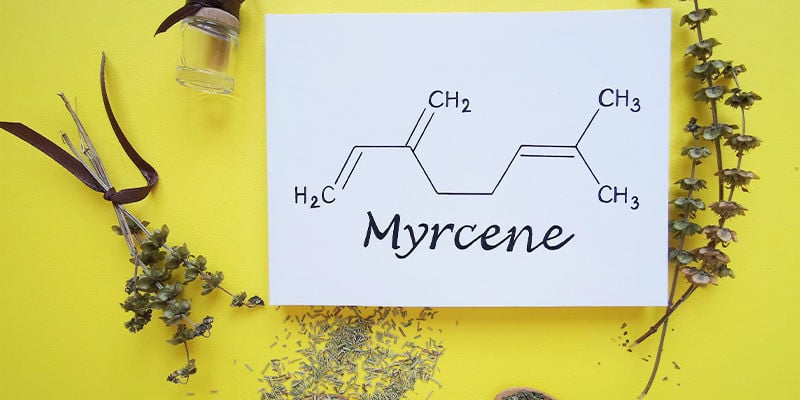
As you can see, there's plenty to like about myrcene. As the most abundant terpene in most strains of cannabis, it’s easy to get paired up with a cultivar that offers just the effects and flavours you’re looking for. All that's left to do is head over to the Zamnesia Seedshop to get your pick of all the myrcene-rich cultivars available now.
- do Vale, T. G., Furtado, E. C., Santos, J. G., & Viana, G. S. B. . (2002/01/01). Central effects of citral, myrcene and limonene, constituents of essential oil chemotypes from Lippia alba (Mill.) N.E. Brown - https://www.sciencedirect.com
- Lee, Jeong-Ho, Lee, Kicheol, Lee, Da Hyun, Shin, Soon Young, Yong, Yeonjoong, Lee, & Young Han. (2015, August). Anti-invasive effect of β-myrcene, a component of the essential oil from Pinus koraiensis cones, in metastatic MDA-MB-231 human breast cancer cells - https://link.springer.com
- Rufino et al. (2015/03/05). Evaluation of the anti-inflammatory, anti-catabolic and pro-anabolic effects of E-caryophyllene, myrcene and limonene in a cell model of osteoarthritis - https://www.sciencedirect.com
- Russo, & E. B. (12 July 2011). Taming THC: potential cannabis synergy and phytocannabinoid-terpenoid entourage effects - https://bpspubs.onlinelibrary.wiley.com
-
 4 min
25 November 2022
What Is Caryophyllene In Cannabis?
Caryophyllene is a cannabis terpene with a spicy aroma reminiscent of black pepper. But how does caryophyllene support the aromas and effects of cannabis? Scroll down to find out more about this...
4 min
25 November 2022
What Is Caryophyllene In Cannabis?
Caryophyllene is a cannabis terpene with a spicy aroma reminiscent of black pepper. But how does caryophyllene support the aromas and effects of cannabis? Scroll down to find out more about this...
-
 3 min
24 October 2022
What Is Pinene In Cannabis?
Heard about pinene and its potential effects in humans? Keep reading for a detailed overview of pinene, one of the most common chemical compounds found in cannabis. Find out what it smells like,...
3 min
24 October 2022
What Is Pinene In Cannabis?
Heard about pinene and its potential effects in humans? Keep reading for a detailed overview of pinene, one of the most common chemical compounds found in cannabis. Find out what it smells like,...
-
 5 min
22 January 2021
What Are Flavonoids, Terpenes, And Terpenoids?
Cannabis flowers appear simple to the naked eye. Yet, these sticky green nuggets house a secret, complex world. Not only do they contain over 100 cannabinoids, but they manufacture hundreds of...
5 min
22 January 2021
What Are Flavonoids, Terpenes, And Terpenoids?
Cannabis flowers appear simple to the naked eye. Yet, these sticky green nuggets house a secret, complex world. Not only do they contain over 100 cannabinoids, but they manufacture hundreds of...
-
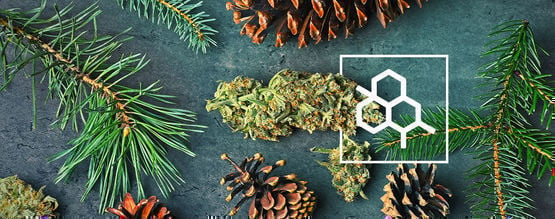 4 min
30 May 2018
Everything You Need To Know About Terpenes
If terpenes and terpenoids sound the same to you, that's because, for the most part, they are. But there is a small difference between these two compounds; terpenes are pure hydrocarbons....
4 min
30 May 2018
Everything You Need To Know About Terpenes
If terpenes and terpenoids sound the same to you, that's because, for the most part, they are. But there is a small difference between these two compounds; terpenes are pure hydrocarbons....













 United States
United States










